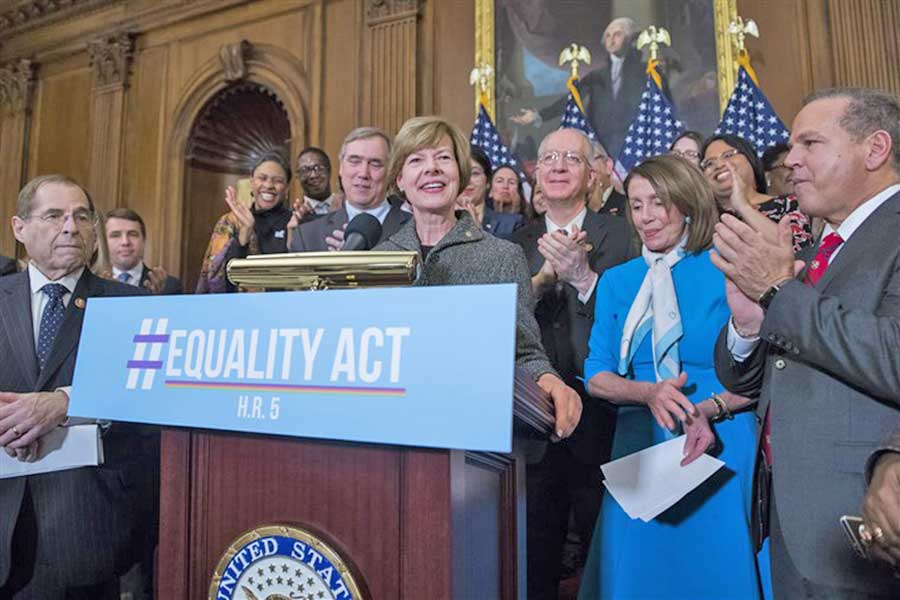The Equality Act was reintroduced in the U.S. House of Representatives on March 13 by Rep. David Cicilline (D-RI) and in the U.S. Senate by Sen. Jeff Merkely (D-OR).
Cicilline, who has served in the House since 2011, was the first openly gay mayor of a state capital and is a co-chair of the Equality Caucus.
On March 11, LGBTQ rights groups, including HRC, ACLU LGBT and HIV Project, National Center for Transgender Equality, Women’s Law Project and Center for American Progress, held a press conference to push for passage of the legislation.
The Congressional LGBT Caucus issued a press release the same day announcing its membership list for the 116th Congress.
“With eight openly LGBT co-chairs, 18 vice chairs, and 155 total members, this is the largest LGBT Equality Caucus in the history of the U.S. House of Representatives,” it stated.
More than 230 representatives and 46 senators are expected to cosponsor the Equality Act. One of them is Congressman Dwight Evans, a longtime ally of the Philadelphia LGBTQ community. Evans had served in the Pennsylvania state legislature from 1981 to 2016, when he was elected to the House.
“I’m proud to cosponsor the Equality Act and I look forward to its passage by the new Democratic majority in the House,” Evans told PGN. “It’s outrageous that LGBT people who can rightfully get married on Sunday can be fired on Monday, just because of who they are. I have a long record of support for the LGBT community — I was one of only a few members in the State House to vote against an anti-marriage-equality resolution in the early 1990s, when a pro-equality stance was not the majority view. I’m glad the country’s view has shifted.”

The Equality Act, if passed, would amend the Civil Rights Act of 1964 to prohibit discrimination on the basis of sexual orientation and gender identity in employment, housing, public accommodations, public education, federal funding, credit and the jury system. The bill was reintroduced in 2015 and again in 2017, but failed to pass both times.
U.S. Rep. Mary Gay Scanlon (D-PA) is a strong supporter of the Equality Act and a newly elected member of the 116th Congress.
“I am proud to be a member of the Equality Caucus, the Trans Rights Task Force, and a cosponsor of the Equality Act. Members of the LGBTQ community deserve the same rights, protections and opportunities as any other American,” she told PGN.
“While the fight for equality has seen rapid progress in the past decade, we are still a long way from full legal and social equality for LGBTQ people. From ensuring equal access to healthcare and employment to fighting direct attacks by the Trump administration on the few existing federal nondiscrimination protections that exist, now more than ever allies must stand strong with the LGBTQ community,” she added.
The office of Congressman Brian Fitzpatrick, the lone Republican member of the Pennsylvania coalition, told PGN that Fitzpatrick had no comment on the Equality Act.
A record 161 corporations, including Microsoft, Apple, Amazon, Google, IBM, Facebook and Twitter, support the Equality Act. That support — and the $3.7 trillion in revenue and operations in all 50 states that come with those companies — is considered pivotal in propelling the bill’s passage this time. In 2015, the bill only had three corporate sponsors.
“The more than 160 leading American companies that have joined HRC’s Business Coalition for the Equality Act are sending a loud and clear message that the time has come for full federal equality,” said HRC President Chad Griffin.
“More and more companies have come to realize just how important it is to have a nationwide standard that treats all employees equally, no matter where they live,” said Stephen Peters, a spokesperson for HRC.
Fifty percent of the national LGBTQ community lives in the 30 states that fail to provide clear legal protections to the LGBTQ population. Pennsylvania is one of those states.
In the press conference, James Esseks, director of the American Civil Liberties Union’s LGBTQ and HIV Project, said a uniform federal law is essential to protecting LGBT civil rights. He added that while some plaintiffs have been winning discrimination lawsuits, “even if we win all those lawsuits, that doesn’t mean we don’t need the Equality Act.”
The need for these protections is viewed as especially critical for women and trans people, who suffer the most discrimination.
“What they go through is something that no one should have to go through,” said Harper Jean Tobin, director of policy at the National Center for Transgender Equality. “We absolutely need to do better, and we certainly can do better.”
Sunu Chandy, legal director of the National Women’s Law Center, said the Equality Act “would provide a framework where everyone has protections.”
“It’s not a coincidence that the 116th Congress is the youngest and most diverse in history — it’s a call to action,” said Rep. Katie Hill, who is openly bisexual. “I am so proud to serve as a co-chair of the largest LGBT Equality Caucus in Congressional history, because now more than ever our communities are demanding representation to ensure their voices are heard.”
The Equality Act was first introduced in 1974 by prominent feminist Congresswoman Bella Abzug (D-NY) and then-Congressman Ed Koch (who later served as New York City mayor and died in 2013) to add sex, sexual orientation and marital status to the Civil Rights Act.
In 1994, the Equality Act was amended to focus only on employment as ENDA — the Employment Non-Discrimination Act. ENDA never passed in the 25 years it has been sponsored. The Equality Act was first reintroduced in 2015.
